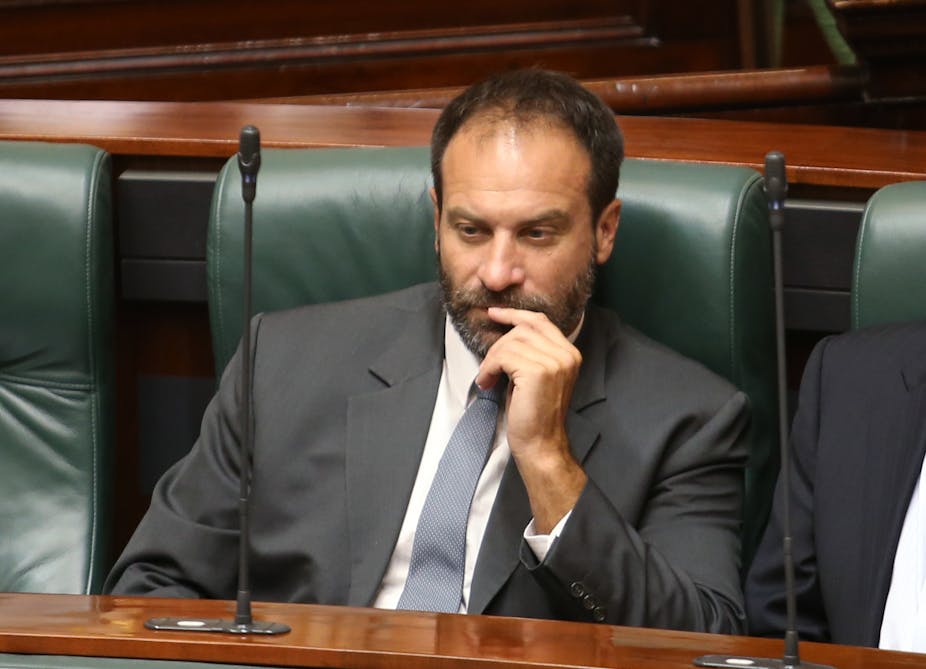Independent MP Geoff Shaw should be grateful the opposition is only proposing to expel him from Victorian state parliament. It could be worse. Victoria’s Legislative Assembly still has the power to lock up its own members for contempt. And if it treads carefully, it can prevent the courts reviewing what it does.
Although Shaw doesn’t need to pack his toothbrush just yet, the debate about his expulsion raises serious questions about the scope of the Legislative Assembly’s powers and the way they are exercised.
Unlike federal parliament, which reformed its contempt powers in 1987, each house of the Victorian parliament still has the power to expel its own members as punishment for contempt. Like the power to imprison, this power was inherited from the British House of Commons under Victoria’s first Constitution Act of 1855.
Contempt of parliament can take many forms. In Shaw’s case, the Legislative Assembly Privileges Committee’s recent report has narrowed down the question to the circumstances in which his parliamentary vehicle was misused. The report found that Shaw contravened the Code of Conduct for Members of Parliament.
Not all contraventions of the Code of Conduct amount to contempt of parliament. The contravention has to be wilful.
This is where the Privileges Committee report got complicated. The majority picked over the evidence of Shaw’s intentions and knowledge, and wasn’t satisfied that his breach of the code was wilful in the sense of being deliberate or reckless. The minority disagreed.
The majority also decided Shaw’s actions weren’t a breach of privilege, which could have been a separate contempt. Here, the minority didn’t disagree.
So, there’s already a basic disagreement about whether Shaw is in contempt of Parliament. There’s also plenty of room for debate about the appropriate penalty, if the Legislative Assembly backs the minority report and finds Shaw in contempt.
Victoria’s Legislative Assembly has sweeping powers to punish for contempt. In 1876, it locked up one of its own members, James McKean, for a week, for misbehaving in the chamber. It had previously imprisoned two newspaper publishers (for criticising members of parliament) and two businessmen (for involvement in parliamentary corruption).
The Legislative Assembly can also reprimand, suspend or expel its members. One of those expelled was the unruly James McKean, who aired his low opinion of the Legislative Assembly after his imprisonment and promptly lost his seat. The last expulsion was in 1901, when Edward Findley got the boot for publishing a newspaper article that attacked King Edward VII.
These cases are now ancient, but the Legislative Assembly’s powers are largely unchanged. In one respect relevant to Shaw, they have grown. Wilful breach of the Code of Conduct can be punished with a fine, but in other cases the Legislative Assembly’s power to fine is unclear.
Also unchanged is the ease with which parliament can avoid judicial scrutiny of its decisions. This is one of the most complex parts of the law of contempt of parliament, but as a general rule the courts won’t question a resolution to expel an MP, at least so long as the resolution doesn’t spell out detailed reasons for the expulsion.
The majority of the Privileges Committee recommended that Shaw be ordered to make an additional repayment for the use of his vehicle. However, it is not clear where the Legislative Assembly would get the power to make the order if, as the majority found, he is not in contempt of parliament. The minority didn’t recommend a penalty, confining themselves to their finding that Shaw was in contempt.
So much for the law. Whatever the outcome this time around, history leaves a lingering suspicion that the Victorian parliament’s contempt powers can be used unfairly or for political advantage. Victoria should follow the example of federal parliament and reform its contempt laws, abolishing the power to expel members and removing the risk of its misuse in future.

